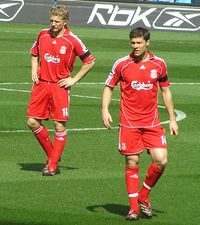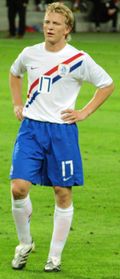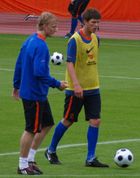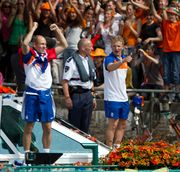Dirk Kuyt
 |
|||
| Personal information | |||
|---|---|---|---|
| Full name | Dirk Kuijt | ||
| Date of birth | 22 July 1980 | ||
| Place of birth | Katwijk aan Zee, Netherlands | ||
| Height | 1.84 m (6 ft 0 in)[1] | ||
| Playing position | Striker/Winger | ||
| Club information | |||
| Current club | Liverpool | ||
| Number | 18 | ||
| Youth career | |||
| 1985–1998 | Quick Boys | ||
| Senior career* | |||
| Years | Team | Apps† | (Gls)† |
| 1998–2003 | Utrecht | 160 | (51) |
| 2003–2006 | Feyenoord | 101 | (71) |
| 2006– | Liverpool | 144 | (36) |
| National team‡ | |||
| 2004– | Netherlands | 71 | (17) |
| * Senior club appearances and goals counted for the domestic league only and correct as of 20:37, 7 May 2010 (UTC). † Appearances (Goals). |
|||
Dirk Kuijt, commonly known as Dirk Kuyt (Dutch pronunciation: [dɪrk kœyt] (![]() listen); born 22 July 1980) is a Dutch professional footballer who currently plays for English club Liverpool. His primary position is as a striker, but now he is more often deployed as a winger for both Liverpool and the Netherlands national team.
listen); born 22 July 1980) is a Dutch professional footballer who currently plays for English club Liverpool. His primary position is as a striker, but now he is more often deployed as a winger for both Liverpool and the Netherlands national team.
Kuyt began his professional career with FC Utrecht in 1998 and quickly became part of their first team. He spent five years at the club and in his final season he won his first senior honour, the Dutch Cup, and was chosen as the season's Dutch Golden Shoe Winner. Following this, he left Utrecht in a €1 million transfer to Feyenoord. He became the club captain in 2005 and was a prolific goalscorer at the Rotterdam club; he was the club's top scorer for three consecutive seasons, the top goalscorer in the 2004–05 Eredivisie season, and the 2005–06 Dutch Footballer of the Year. Kuyt missed only five games over seven seasons from 1999 until 2006 and appeared in 179 consecutive matches between 2001–06.
He left Feyenoord after three years, having scored 71 league goals in 101 appearances, and joined Premier League side Liverpool for £10 million.[2] He made his Premier League debut late in 2006 and immediately became part of the first team squad. He scored in his first ever UEFA Champions League final with Liverpool against AC Milan, with Kuyt offering late hope for Liverpool although eventually losing 2–1.
He made his international debut in 2004 and has represented the Netherlands at three major international tournaments, the 2006 FIFA World Cup, UEFA Euro 2008 and the 2010 FIFA World Cup.
Contents |
Biography
Early life
Kuyt is the third of four children. He grew up in the fishing town of Katwijk aan Zee.
His football career began when he joined the local amateur team Quick Boys at age 5. He broke into the first team in March 1998, playing the last six games of the season, and catching the eye of Eredivisie team FC Utrecht.[3] Kuyt still regularly visits Katwijk and his old club Quick Boys, who benefited from a £300,000 windfall as a result of the player's move to Liverpool.
Club career
FC Utrecht

Kuyt signed professionally for FC Utrecht that summer, aged 18, and immediately established himself in the first team. However he was more often than not played as a winger, as they preferred to play Serbian Igor Gluščević up front.
This continued until the 2002–03 season when Foeke Booy was installed as the club's new manager. Booy played Kuyt as a striker / attacking midfielder (behind the striker) for the entire season, and Kuyt repaid him with 20 league goals. FC Utrecht also reached the Dutch Cup final, where they met Feyenoord. Although they were the underdogs Utrecht comfortably won the cup 4–1, with Kuyt scoring one and being given the man-of-the-match award. At the end of the season Kuyt completed a €1 million move to Feyenoord, where he replaced the out-going Pierre van Hooijdonk.
Feyenoord
At Feyenoord, Kuyt immediately became a fan's favourite with his continued goal scoring success. His first season saw him net another 20 league goals. The opening game of the 2004–05 season marked Kuyt's first ever hat-trick against De Graafschap. He later went on to score three in the 6–3 victory against Den Haag and ended the season as the Eredivisie's top scorer with 29 goals—a career high.
In 2005 Kuyt was handed the Feyenoord club captaincy and went on to have a third successful season with the club, scoring 25 goals in all competitions.

Over the summer of 2006 Kuyt was again linked with moves to many top English clubs, most notably Liverpool and Newcastle United. Rumours started in May with Dirk Kuyt stating "I am happy at Feyenoord but I would like to play in the Premier League."[4] Kuyt completed a move to Liverpool on 18 August for an undisclosed fee.
Kuyt missed only five games over seven seasons from 1999 until 2006, making 233 appearances.[3] Between March 2001 and April 2006 he played 179 consecutive matches.
Liverpool
2006–07 season
Upon joining Liverpool, Kuyt stated "I only wanted to leave Feyenoord for a really big club, and that is what Liverpool are. They are a fantastic big club and it will be a real pleasure to play here."[5]
After sitting out the first game Kuyt made his Liverpool debut as a substitute against West Ham on 26 August 2006. His first start came against PSV in the Champions League and he has been first choice in most games since. He immediately got praises for the new defensive approach by a striker. In his third start for the club on 20 September 2006 Kuyt scored his first goal against Newcastle United in a Premier League game at Anfield,[6] and followed up with another against Tottenham Hotspur in the next game. He scored his third goal for Liverpool with his father watching the game at Anfield, contributing to Liverpool's 3–1 win over Aston Villa. Two weeks later he bagged a brace, as the only scorer in the Reds' 2–0 victory against Premiership newcomers Reading.
Kuyt won much praise for his early performances, with Daily Mirror stating: "The Dutch striker has the look of a cult hero in the making"[7] and The People reporting that he is "propelling himself towards iconic status."[8] One of the reasons for his early popularity is his post match courtesy to the fans. After each match he walks to every corner of the ground, and applauds the Liverpool supporters.

On 20 January 2007, Dirk Kuyt opened the scoring against Chelsea after only 4 minutes after a Peter Crouch flick-on. Liverpool went on to defeat the champions 2–0. It was the first time Rafael Benítez had defeated José Mourinho in the Premiership. It was also the first goal scored by Liverpool against a top four club in the league in the 2006–07 season. Kuyt moved his league-goal tally into double figures by scoring the first goal in the game against West Ham on 30, January 2007.
Kuyt played a key part in Liverpool's penalty shoot-out win over Chelsea in the semi-finals of the 2006–07 Champions League. Firstly in extra-time he had a goal disallowed for offside from Xabi Alonso's strike. Kuyt also scored the winning penalty in the shoot-out, and scored a consolation goal in their 2–1 defeat to Milan in the final.
2007–08 season
He scored his first goals of the 2007–2008 season in Liverpools 4–0 victory over Toulouse in their 3rd round qualifying encounter at Anfield on 28 August 2007. He scored two penalties against Everton in the Merseyside derby to give Liverpool a 2–1 win.
Kuyt failed to score in 13 games for Liverpool, before netting against Barnsley in the fifth round of the FA Cup.
On 19 February 2008, Kuyt scored the first goal in the first leg of the round of 16 of the 2007–08 Champions League against favourites Internazionale in a 2–0 win.
Starting in early 2008, Kuyt began to be employed as a right winger and set up two of Fernando Torres's goals against West Ham in March. He adapted to this new role and soon regained his overall form, playing himself into the starting XI again after putting on various vital team performances. On 2 April 2008, Kuyt scored an equalising goal against Arsenal at the Emirates stadium.
On 22 April 2008, in the first leg of the Champions League all-English semi-final against Chelsea at Anfield, Kuyt scored the opening goal just before half time.
2008–09 season
Dirk Kuyt scored a late extra time goal against Standard Liège in the 2008–09 Champions League qualifiers return match to put Liverpool through to the group stages of the competition. In his next game, a 2–1 win in the Premier League against Manchester United, he assisted fellow countryman Ryan Babel's winning goal.
Kuyt's goals at vital moments in important games, such as the last minute strike against Standard Liege, an injury time winner against Manchester City on 5 October 2008 and twice in Liverpool's 3–2 comeback win over Wigan Athletic on 18 October 2008, have led to his reputation as a "Big Game Player"
The 2008/09 season saw Kuyt score 15 goals for the club, his best return for the club.
2009–10 season
As a result of heavy injuries sustained by the Liverpool squad, Kuyt often found himself playing a central striker role. Kuyt scored against Stoke and Burnley in two home 4–0 triumphs. He also scored the winning goal in Liverpool's opening Champions League group game against Hungarian team Debrecen in a 1–0 win. Kuyt's goal against Debreceni means only Ian Rush and Steven Gerrard have scored more goals for the club in the European Cup. It was his 12th goal in Europe's premier club competition.[9] Kuyt scored his 4th league goal of the season in a vital 2–0 win against Everton at Goodison Park, in the Merseyside derby. He took his season's goal tally to six, his fifth in the league, by scoring in a 2–1 premier league loss to Arsenal at Anfield. On 20 January, Kuyt scored both goals at Anfield against Spurs in a 2–0 victory and a week later, scored the opener against Bolton. For both goals, he was assisted by Alberto Aquilani which could be the start of a new partnership. Against Spurs, he played a delightful one-two with Alberto Aquilani before slotting it home. While against Bolton, Alberto Aquilani guided an Emiliano Insua cross back into the path of Kuyt who slotted it home. On many occasions, they linked up together and threatened to score.
On the 6th of February he scored his fourth goal in the Merseyside Derby, a header from a corner against Everton in the 55th minute bringing his tally of goals for Liverpool to 50 in all competitions. He was also awarded man of the match for this game which Liverpool won 1–0. On the 8th April he notched his 51st goal for Liverpool with a crucial yet controversial header in the Europa League against Benfica. The goal, a header direct from a corner, was originally dissallowed by the linesmen for offside, but after some heavy protests by the Liverpool players and manager Rafael Benitez that you couldn't be offside directly from a corner, the referee changed his mind and allowed the goal. Kuyt played in his 200th competitive game for Liverpool, against Hull City on the final day of Liverpool's dismal season.
International career

When Marco van Basten took over as coach of the Dutch national team he dropped many established players, including strikers Roy Makaay and Patrick Kluivert. Kuyt was to benefit as in September 2004 he made his international debut in van Basten's first game against Liechtenstein. He has been a permanent fixture in the Dutch squad ever since, making the starting line-up for eleven of the Netherlands' twelve 2006 World Cup qualification matches.[10]
2006 World Cup
At the 2006 World Cup, Kuyt found himself relegated to the substitutes bench. Although he made an appearance as a 69th minute replacement in the first game against Serbia and Montenegro, he sat the entire second game out. With the team already qualified for the next round van Basten decided to rest many of his first choice players for the final group game against Argentina,[11] and Kuyt was handed a start in the right wing position.

For the Netherlands' Round of 16 tie against Portugal, Kuyt was given a surprise start ahead of star-striker Ruud van Nistelrooy. However, Kuyt did not have a successful game and the Netherlands eventually lost 1–0 in a game that was more reputable for its record breaking disciplinary record (4 red cards and 16 yellow cards).[12]
Euro 2008
Kuyt was selected for the Dutch squad for Euro 2008. On 9 June, he played in their opening Group C match, a 3–0 victory over 2006 World Champions Italy, assisting in two goals, his most notable act being the header that provided the link between Giovanni van Bronckhorst's crossfield pass and Wesley Sneijder's goal to make it 2–0 on 31 minutes. On 13 June, Kuyt contributed his team's second in the next game of Group C, a 4–1 victory over 2006 World Cup finalists France by opening the scoring with a ninth minute header from a corner,[13][14] taking his tally of international goals to eight. During Euro 2008, Kuyt was employed as a winger, partnering with Sneijder and Rafael van der Vaart in the midfield due to the team's change of formation from 4-3-3/4–4–2 to 4–2–3–1.
Post Euro 2008

Thus far, Kuyt has scored 3 goals in the 2010 World Cup qualifiers. During a friendly against England, he opened the scoring less than ten minutes after kick-off, pouncing on Rio Ferdinand's poor back pass.
2010 World Cup
Kuyt was included in the preliminary squad for the 2010 FIFA World Cup in South Africa.[15] On 27 May 2010, Netherlands manager Bert van Marwijk announced that the player would be part of the final squad of 23 participating in the competition.[16]
Kuyt scored Holland's second goal in the 85th minute of their 2-0 win over Denmark in their opening group match on a tap-in after Eljero Elia's shot hit the post. In the July 2 quarterfinal match against Brazil, Kuyt flicked a corner on to Sneijder who headed the ball into the net, effectively giving the Dutch a 2-1 lead. He also assisted the goal scored by Arjen Robben against Uruguay in the semi-finals.
Kuyt started all seven matches for the Dutch and finished the tournament with one goal and three assists.
International goals
| # | Date | Venue | Opponent | Score | Result | Competition |
|---|---|---|---|---|---|---|
| 1. | 9 October 2004 | Skopje City Stadium, Skopje, Macedonia | 2–1 | 2–2 | FIFA World Cup 2006 qualification | |
| 2. | 4 June 2005 | De Kuip, Rotterdam, Netherlands | 2–0 | 2–0 | FIFA World Cup 2006 qualification | |
| 3. | 8 June 2005 | Olympic Stadium, Helsinki, Finland | 0–2 | 0–4 | FIFA World Cup 2006 qualification | |
| 4. | 1 March 2006 | Amsterdam ArenA, Amsterdam, Netherlands | 1–0 | 1–0 | Friendly | |
| 5. | 6 September 2006 | Philips Stadion, Eindhoven, Netherlands | 3–0 | 3–0 | UEFA Euro 2008 qualifying | |
| 6. | 22 August 2007 | Stade de Genève, Geneva, Switzerland | 2–1 | 2–1 | Friendly | |
| 7. | 24 May 2008 | De Kuip, Rotterdam, Netherlands | 1–0 | 3–0 | Friendly | |
| 8. | 13 June 2008 | Stade de Suisse, Bern, Switzerland | 1–0 | 4–1 | UEFA Euro 2008 | |
| 9. | 19 November 2008 | Amsterdam ArenA, Amsterdam, Netherlands | 3–1 | 3–1 | Friendly | |
| 10. | 28 March 2009 | Amsterdam ArenA, Amsterdam, Netherlands | 3–0 | 3–0 | FIFA World Cup 2010 qualification | |
| 11. | 1 April 2009 | Amsterdam ArenA, Amsterdam, Netherlands | 1–0 | 4–0 | FIFA World Cup 2010 qualification | |
| 12. | 3–0 | |||||
| 13. | 12 August 2009 | Amsterdam ArenA, Amsterdam, Netherlands | 1–0 | 2–2 | Friendly | |
| 14. | 3 March 2010 | Amsterdam ArenA, Amsterdam, Netherlands | 1–0 | 2–1 | Friendly | |
| 15. | 1 June 2010 | De Kuip, Rotterdam, Netherlands | 1–0 | 4–1 | Friendly | |
| 16. | 14 June 2010 | Soccer City, Johannesburg, South Africa | 2–0 | 2–0 | 2010 FIFA World Cup | |
| 17. | 3 September 2010 | Stadio Olimpico, Serravalle, San Marino | 0–1 | 0–5 | UEFA Euro 2012 qualifying |
Personal life
Kuyt's wife Gertrude has found favour in the Dutch media for her down-to-earth attitude. She continued to work as a nurse in an old people's home after marrying Kuyt until their daughter, Noelle, was born. Kuyt and his wife now carry out extensive charity work off the pitch. Most notably, he and his wife set up the Dirk Kuyt Foundation to help disadvantaged children in his homeland and the Third World. One of the ways the foundation raises money is by selling DK-branded clothes.[17]
Kuyt's father died of cancer on 29 June 2007.[18]
Statistics
Correct as of 10 May 2010
| Club | Season | FA Cup | League Cup | Europe | Others | Total | |||||||
|---|---|---|---|---|---|---|---|---|---|---|---|---|---|
| App | Goals | App | Goals | App | Goals | App | Goals | App | Goals | App | Goals | ||
| Liverpool | 2010–11 | 3 | 0 | 0 | 0 | 0 | 0 | 1 | 1 | 0 | 0 | 4 | 1 |
| 2009–10 | 37 | 9 | 2 | 0 | 1 | 0 | 13 | 2 | 0 | 0 | 53 | 11 | |
| 2008–09 | 38 | 12 | 2 | 0 | 0 | 0 | 11 | 3 | 0 | 0 | 51 | 15 | |
| 2007–08 | 32 | 3 | 4 | 1 | 0 | 0 | 12 | 7 | 0 | 0 | 48 | 11 | |
| 2006–07 | 34 | 12 | 1 | 1 | 2 | 0 | 11 | 1 | 0 | 0 | 48 | 14 | |
| Total | 144 | 36 | 9 | 2 | 3 | 0 | 48 | 14 | 0 | 0 | 204 | 52 | |
| Club | Season | Dutch Cup | - | Europe | Play-offs | Total | |||||||
| App | Goals | App | Goals | App | Goals | App | Goals | App | Goals | App | Goals | ||
| Feyenoord | 2005–06 | 33 | 22 | 1 | 0 | - | - | 2 | 1 | 2 | 2 | 38 | 25 |
| 2004–05 | 34 | 29 | 3 | 4 | - | - | 7 | 3 | - | - | 44 | 36 | |
| 2003–04 | 34 | 20 | 2 | 1 | - | - | 4 | 1 | - | - | 40 | 22 | |
| Total | 101 | 71 | 6 | 5 | – | – | 13 | 5 | 2 | 2 | 122 | 83 | |
| FC Utrecht | 2002–03 | 34 | 20 | 4 | 2 | - | - | 2 | 1 | - | - | 40 | 23 |
| 2001–02 | 34 | 7 | 3 | 3 | - | - | 4 | 1 | - | - | 41 | 11 | |
| 2000–01 | 32 | 13 | 5 | 3 | - | - | 0 | 0 | - | - | 37 | 16 | |
| 1999–00 | 32 | 6 | 4 | 4 | - | - | 0 | 0 | - | - | 36 | 10 | |
| 1998–99 | 28 | 5 | 2 | 1 | - | - | 0 | 0 | - | - | 30 | 6 | |
| Total | 160 | 51 | 18 | 13 | – | – | 6 | 2 | – | – | 184 | 66 | |
| Overall Total | 405 | 158 | 33 | 20 | 3 | 0 | 67 | 21 | 2 | 2 | 510 | 201 | |
Career honours

Club
- KNVB Cup: 2002–03
Netherlands
- FIFA World Cup (Silver Medalist): 2010
Individual
- Eredivisie Top Scorer: 2005
- Dutch Golden Shoe 2003, 2006
References
- ↑ "18. Dirk Kuyt". Liverpool F.C.. http://www.liverpoolfc.tv/team/first-team/player/18-dirk-kuyt. Retrieved 6 September 2010.
- ↑ Burt, Jason (18 August 2006). "Kuyt flies in to join Liverpool 'dream' team". The Independent. http://www.independent.co.uk/sport/football/premier-league/kuyt-flies-in-to-join-liverpool-dream-team-412333.html. Retrieved 6 September 2010.
- ↑ 3.0 3.1 "Detailed stats and profile of Liverpool's Dirk Kuyt". LFChistory.net. http://www.lfchistory.net/redcorner_articles_view.asp?article_id=1202. Retrieved 29 August 2006.
- ↑ "Kuyt reveals Liverpool approach". BBC Sport. 17 July 2006. http://news.bbc.co.uk/sport1/hi/football/teams/l/liverpool/5011150.stm. Retrieved 24 May 2006.
- ↑ "Kuyt: I can handle 'big club' pressure". FOX Sports. http://msn.foxsports.com/soccer/story/5886260. Retrieved 19 August 2006.
- ↑ "Liverpool 2–0 Newcastle". BBC Sport. 20 September 2006. http://news.bbc.co.uk/sport1/hi/football/eng_prem/5351794.stm. Retrieved 21 September 2006.
- ↑ Maddock, David (25 September 2006). "Liverpool 3–0 Tottenham". The Mirror. http://www.mirror.co.uk/sport/football/tm_objectid=17813182&method=full&siteid=94762&headline=liverpool-3-0-tottenham-name_page.html. Retrieved 26 September 2006.
- ↑ Bates, Steve (24 September 2010). "Kuyt shows killer touch to win the hearts of Anfield". The People. http://www.people.co.uk/sport/football/tm_objectid=17809229&method=full&siteid=93463&headline=rafa-finds-the-perfect-blond--name_page.html. Retrieved 26 September 2006.
- ↑ [1]
- ↑ "2006 World Cup Game Log". ESPNsoccernet. http://soccernet.espn.go.com/players/international?id=11189&league=fifa.world&season=2006&cc=5739. Retrieved 30 August 2006.
- ↑ "Holland 0–0 Argentina". BBC Sport. 21 June 2006. http://news.bbc.co.uk/sport1/hi/football/world_cup_2006/4853328.stm. Retrieved 30 August 2006.
- ↑ "Portugal 1–0 Holland". BBC Sport. 25 June 2006. http://news.bbc.co.uk/sport1/hi/football/world_cup_2006/4991538.stm. Retrieved 30 August 2006.
- ↑ "Netherlands 4–1 France". BBC Sport. 13 June 2008. http://news.bbc.co.uk/sport2/hi/football/euro_2008/netherlands/7451438.stm. Retrieved 14 June 2008.
- ↑ Netherlands vs France match report
- ↑ "Van Marwijk trims Dutch squad to 27". AFP. 2010-05-15. http://www.google.com/hostednews/afp/article/ALeqM5iO9bETRJh0iovmmUN7ZeFDugTEIg. Retrieved 2010-05-18.
- ↑ "Holland coach Bert van Marwijk finalises World Cup squad". The Guardian. 2010-05-27. http://www.guardian.co.uk/football/2010/may/27/holland-world-cup-23-man-squad. Retrieved 2010-05-27.
- ↑ "He's a star, no doubt". http://www.sportstaronnet.com/tss2941/stories/20061014006903100.htm. Retrieved 28 August 2008.
- ↑ Collins, Roy (2008-04-27). "Dirk Kuyt is playing through the pain". Telegraph. http://www.telegraph.co.uk/sport/football/2298543/Dirk-Kuyt-is-playing-through-the-pain.html. Retrieved 2010-04-19.
External links
- Official Liverpool profile
- Dirk Kuyt - FIFA competition record
- Stats and Analytics of Dirk Kuyt at Footbalistic
- The Dirk Kuyt Foundation
- Dirk Kuyt career stats at Soccerbase
- Dirk Kuyt profile and stats at Wereld van Oranje (Dutch)
- LFChistory.net player profile
- Thisisanfield.com player profile
- ESPN Profile
|
|||||||||||||||||||||||||||||
|
|||||||||||||||||||||||
|
|||||